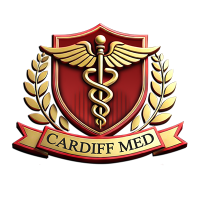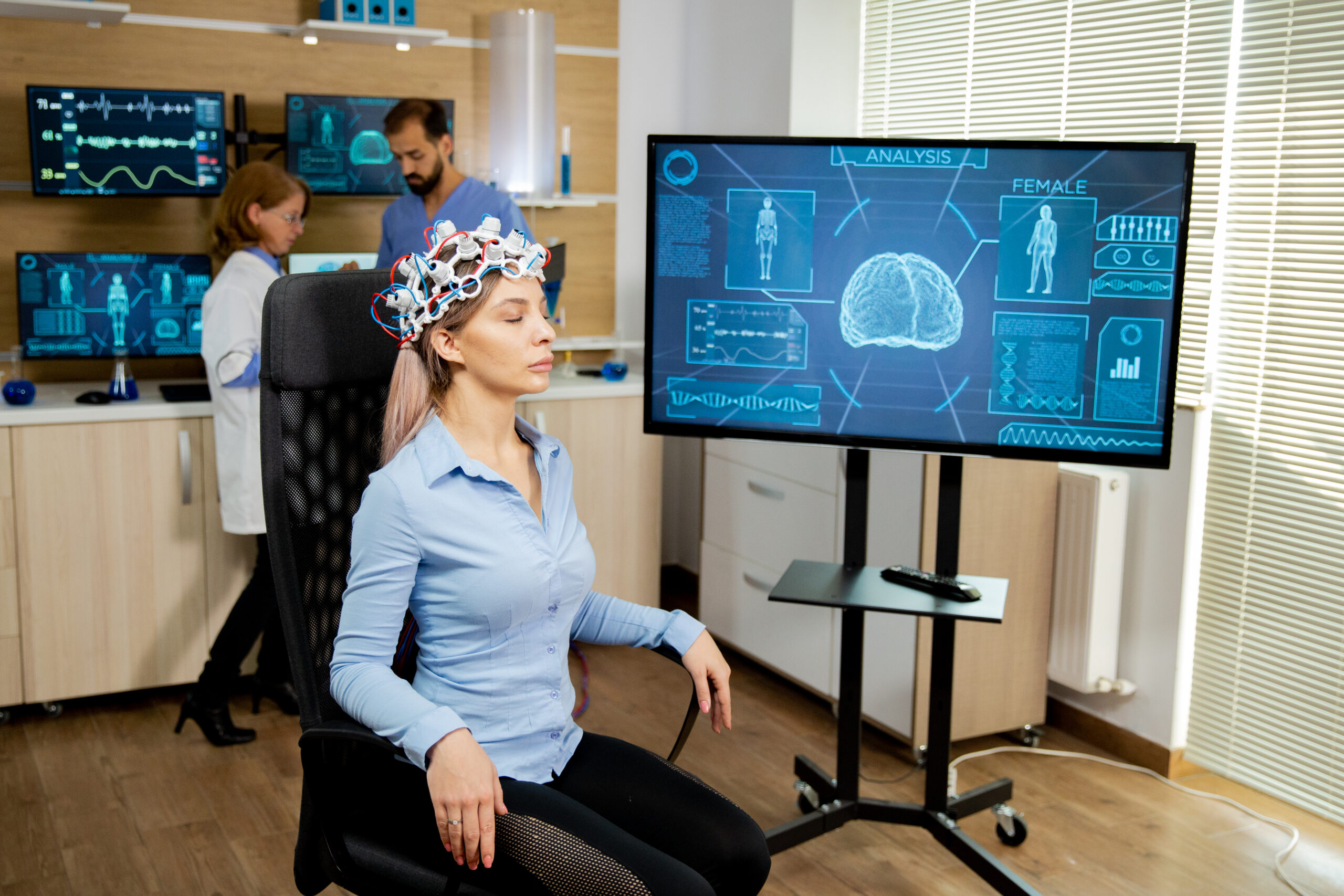MSc Neurology
This course also develops your research and analytical abilities through a professional project focused on your area of interest, preparing you for leadership roles in neurological care.
Overview
At CardiffMed, our MSc in Neurology is designed for healthcare professionals aiming to deepen their expertise and advance their careers in the ever-evolving field of neurology.
This fully online course equips you with the skills to diagnose, treat, and manage a wide range of neurological disorders, while developing critical research and analytical abilities. You’ll also complete a professional project focused on an area of your interest within neurology.
Entry Requirements
Our MSc Neurology programme is open to UK and international healthcare professionals, thanks to our fully online learning model.
Who Can Apply?
- Registered healthcare professionals with a first degree (or equivalent international qualification) in a relevant healthcare field — e.g., medicine, nursing, or allied health sciences.
- Applicants with extensive clinical experience but without a formal degree may also be considered on an individual basis.
Additional Considerations
-
In some cases, applicants may be asked to submit a sample of academic work to demonstrate their ability to engage with postgraduate-level study.
-
Prior clinical and professional experience will be taken into account during the application review.
- A copy of your updated CV including your address and date of birth.
- A copy of your undergraduate degree certificate.
- The name and email address of someone who is able to provide a reference, this can be a work colleague, employer or former tutor.
- A detailed personal statement explaining why you would like to undertake the course.
- A copy of your proof of English competency (see below).
Proficiency in the English language is also essential to completing our courses. If English is NOT your first language, we ask for proof of competency during the application process. We are able to accept an IELTS overall score of 6.5 (with a minimum of 6.0 for each band) or an equivalent qualification.
If you do not meet these requirements, please don’t worry. You can also contact our admissions team on admissions@cardiffmed.com for more information on the qualifications we accept.
Key Facts
- Awarding University
- Starting Date: 1st September 2025
- Application Deadline : 29th August 2025
- Class Size : 15 - 20
- Duration : 24 months
- Commitment : Part-time
- Format : 100% Online
Course Fees
- Deposit for September 2025: £415 †
- Total Course Fees for UK & International Students for September 2025: £8,880 ††
Payment Options
- Option 1: Upfront Payment in full. Pay-in-full discount is available.
- Option 2: Apply for Interest-free payments each month for the duration of the course.
Payment Plan Breakdown
First Year Payments
| Deposit | 10 Monthly Payments | Final Payment |
| £415 † | £415 | £415 |
Total first year payments: £4,980
Second Year Payments
| 11 Monthly Payments | Final Payment |
| £325 | £325 |
Total second year payments: £3,900
You may also be interested in:
- Spread the cost with Lendwise, who offer financing options for up to 8 years. ††††
† Deposits are non-refundable
†† Prices are subject to review following each intake
†††† Subject to eligibility criteria.
Course Modules and Learning Outcomes
The online Paediatrics and Child Health MSc is a two-year course consisting of eight modules (180 credits), with the first 120 credits deriving from the Postgraduate Diploma.
Year 1
Module Aims
To provide a systematic understanding of the knowledge and skills required to identify, diagnose, treat, and manage a range of acute neurological conditions in a variety of settings using the latest evidence-based knowledge and stimulating discussion on different diagnoses.
Module Content
- Acute headache (including migraine)
- Acute central nervous system infections (including meningitis)
- Acute weakness, paraplegia, paraparesis
- Acute encephalopathy
- Neurology in cancer
- Acute confusion and delirium
Learning Outcomes
- Demonstrate a systematic understanding of the presentation, diagnosis, and management of a range of acute neurological conditions
- Critically evaluate the evidence and guidance relating to the diagnosis, investigation, and management of acute neurological conditions
- Synthesise the evidence and critically apply it to the management of patients presenting with acute neurological symptoms
Module Aims
To develop a comprehensive understanding of the presentation, investigation, and management of patients with epilepsy or epilepsy mimics, while increasing the knowledge surrounding the semiology of seizures and the management of chronic epilepsy in a variety of settings.
Module Content
- Definition/classification
- Acute management
- Semiology of seizures
- Management and investigation of chronic epilepsy
- Epilepsy mimics
Learning Outcomes
- Critically apply a systematic understanding of the presentation, diagnosis, and management of epilepsy and conditions which mimic epilepsy
- Critically evaluate the evidence and guidance relating to the diagnosis, investigation, and management of epilepsy
- Construct management strategies for the investigation and clinical management of presentations of epilepsy to strategically enhance team performance in complex situations
Module Aims
To develop an in-depth knowledge and understanding of the presentations, investigations, and management of patients experiencing transient ischaemic attacks and strokes, including methods of prevention and rehabilitation that would involve multidisciplinary team approaches in a variety of settings.
Module Content
- Classification and identification of transient ischaemic attack
- Stroke presentations
- Investigation and management of stroke
- Primary and secondary prevention of stroke
- Stroke rehabilitation
- Stroke mimics
Learning Outcomes
- Develop a systematic understanding of the presentation, diagnosis, and management of transient ischaemic attacks, stroke, and stroke mimics
- Critically evaluate the evidence and guidance relating to the diagnosis, investigation, and management of transient ischaemic attacks and stroke
- Develop an ability to synthesise the evidence and critically interpret this into the care of patients presenting with transient ischaemic attacks and strokes including the role of the multidisciplinary team
Module Aims
To develop an understanding of multiple sclerosis including the presentations, classification, investigation, and management of patients with multiple sclerosis and other neuro-inflammatory conditions in a variety of settings.
Module Content
- Multiple sclerosis presentation and classification
- Multiple sclerosis investigation strategies
- Multiple sclerosis specific management
- Long-term management and rehabilitation of multiple sclerosis
- Other neuro-inflammatory conditions
- Other neuro-inflammatory conditions (continued)
Learning Outcomes
- Demonstrate an in-depth understanding of the diagnosis, treatment, and management of multiple sclerosis and other neuroinflammatory conditions
- Develop an ability to critically evaluate and synthesise the evidence relating to the diagnosis and management of a patient presenting with multiple sclerosis and other neuro-inflammatory conditions
- Synthesise the evidence and implement the knowledge into clinical practice to improve the management of patients presenting with multiple sclerosis and other neuro-inflammatory conditions
Module Aims
To develop an in-depth understanding of the diagnosis, classification, and management of peripheral neurological disorders utilising current findings and guidance in a variety of settings.
Module Content
- Acute Guillain-Barre syndrome (GBS) and GBS like disorders
- Mononeuritis multiplex and differential diagnoses
- Chronic inflammatory demyelinating polyneuropathy (CIDP)
- Entrapment neuropathies
- Chronic neuropathies
- Genetic neuronopathies
Learning Outcomes
- Demonstrate a systematic knowledge of the assessment, classification, and management of a range of peripheral neurological disorders
- Critically evaluate the evidence and guidance relating to the diagnosis, investigation, and management of peripheral neurological disorders
- Synthesise the evidence and critically interpret this into the care of patients presenting with a range of peripheral neurological disorders
Module Aims
To develop a comprehensive understanding of the classification, diagnosis, and management of neurodegenerative conditions in a variety of settings, through the analysis of the latest guidance and findings.
Module Content
- Presentation and differential diagnosis in movement disorders
- Parkinson’s disease and multisystem atrophy
- Parkinson’s disease evidence-based management
- Classification, identification, and diagnosis of cognitive impairment
- Investigation and management of cognitive impairment
- Motor neurone disease (MND)
Learning Outcomes
- Demonstrate an in-depth understanding of the diagnosis, treatment, and management of a range of neurodegenerative conditions
- Critically evaluate the evidence and guidance relating to the diagnosis, investigation, and management of neurodegenerative conditions
- Synthesise the evidence and critically interpret this into the care of patients presenting with neurodegenerative conditions
Year 2
Module Aims
To develop students’ ability to critically appraise specific areas of clinical, research and/or organizational practice and develop skills in independent research, study, and writing for publication.
Module Content
This module will depend on the creation of a piece of work based upon a specific clinically related project relevant to the student’s practice. This project may comprise:
- Literature review and appraisal of the evidence
- Audit of practice including organizational or clinical
- Review and implementation of evidence-based practice
- Qualitative or quantitative research (formal research involving human subjects is not anticipated)
- Case(s)-based and quality of service review with critical appraisal
- Case report, review of the literature and organizational assessment
Assessment Methods
This programme emphasises learning through active participation in case-based discussions, reflection, and real-life scenarios. Students engage with clinical cases that mirror everyday practice, fostering problem-solving and evidence-based application from the very beginning.
Across the modules, assessments are integrated with learning. Each week, you will work through two to three clinical cases, discussing and reflecting on them with peers under the guidance of an expert tutor. These discussions form the core of your learning and are also the basis for your assessments.
Our innovative teaching methods are designed to help you translate this learning into real-world clinical practice. You’ll need to regularly log in to participate in discussions, ideally on a daily basis, and commit approximately two hours per day to your studies. Our dedicated Student Support Team is available to assist with any challenges you may encounter, from navigating our online platform to managing deadlines.
How Foundational Knowledge is Developed
The programme is structured so that foundational knowledge is introduced through carefully designed clinical cases. Each case is crafted to highlight essential concepts and progressively deepen your understanding as you apply critical thinking and evidence-based analysis. This hands-on approach ensures that you are not only acquiring theoretical knowledge but also learning how to apply it in a practical, clinical setting.
This programme is suited for professionals who thrive in an online, discussion-based learning environment. Please note that this course focuses on interactive, applied learning through peer collaboration and case discussions. You will be fully supported, encouraged and led through the programme to success and graduation!
Year 1
- Every week students are presented with two/three clinical case-based scenarios that are reflective of every day clinical practice and research.
- Tutors will post a number of questions and prompts to aid students in a formal discussion of each case.
- These discussions are facilitated throughout by your tutor and are then assessed at the end of every module.
For this assessment, students will work on a group assignment and/or an individual assignment.
- Group assignments are designed to hone skills in the multidisciplinary, holistic approach to modern treatments and patient management by requiring group participation in a single piece of work.
- Individual assignments are designed to hone skills in academic career progression through such tasks as reviewing papers, developing scientific posters or abstracts, peer-reviewing, social media activities, patient information leaflets and essays.
The reflective journal is used by students throughout each module to monitor personal progress. This is guided by weekly feedback from your tutor and is graded at the end of every module. The journal typically includes the following:
- Initial expectations and reasons for taking the course.
- Module and/or personal learning objectives.
- Description of events, issues and learning points within current personal practice.
- Change in every day practice due to knowledge gained on each module.
- A description of what has been learned during the module.
- Case problems in the form of a one-hour timed examination with multiple-choice questions directly test the reasoning and knowledge objectives of the module.
- The online exam is marked automatically.
- The examination tests related theory and problem-solving skills.
Year 2
This module runs over an 8 week period and is designed to develop skills in critical appraisal and knowledge of research methodologies. The module consists of mandatory formative assessment activities to support your learning and development prior to the Professional Project module.
Students will work with their supervisor to submit a professional project proposal for their chosen topic.
Students will deliver an abstract (1000 words) outlining their proposal and, if deemed necessary, develop and submit documentation for the University’s ethical committee approval.
- Students will create a dissertation, the theme of which has been developed in discussion with their tutor.
- Supervision will normally involve direct online support involving planned progress, supporting research activity and reading student work.
- Supervisors and students will agree on a communications plan, which may involve emails or online chats. Some students may employ the use of freely available chat or audio conferencing facilities for live discussion with supervisors.
- Students will have access to online forums where they can develop their research capabilities together.
- All communications with tutors will be logged on the Professional Project forum by the student, and consist of brief summaries of discussion.
Why Study a Neurology Master's with CardiffMED
100% Flexible
Our courses are 100% online. No fixed study times mean you can log in and learn whenever and wherever.
Multidisciplinary – study in a group of doctors, nurses, pharmacists and other healthcare professionals.

Career Boosting
Get a University-validated postgraduate qualification in just 1 calendar year instead of 2 academic years.
40% of our alumni reported a salary increase 2 years after studying with us.

Expert Led
All of our programmes are authored and developed by world-leading experts in their field.
Our faculty are selected due to their subject expertise, experience and teaching abilities to ensure the highest standards of educational excellence.

Our master in neurology is designed for healthcare professionals who have a background in medicine, nursing, or allied health professions, and who wish to specialize in the field of neurology. These include:
- Doctors
- Nurses
- Therapists
- Neurological rehabilitation specialist
- Geriatricians
- Primary care physicians
- Neuro-diagnostic technologist
- Nurse practitioners
- Specialists in related fields including stroke, acute medicine, paediatrics and psychiatry.
You'll learn through our flexible, interactive online platform, which allows you to engage with clinical cases, complete assignments, and collaborate with fellow students at times that suit your schedule. There's no fixed timetable—simply log in daily to participate in the week's activities.
Our teaching approach is highly interactive, using small groups of 10-20 students to foster a collaborative environment where you can engage in thoughtful discussions and receive guidance from your tutor. You'll have access to learning resources and discussion forums that encourage ongoing interaction and deeper engagement with the material.
Throughout your studies, you'll receive support from a dedicated expert tutor and our Student Support Team, ensuring you have the resources needed to navigate the course successfully.
Why Enroll in This Program
Why Choose CardiffMED for MSc Neurology?
At CardiffMed, we are dedicated to advancing neurological education and clinical expertise. Our MSc Neurology program empowers healthcare professionals to meet the rising demand for neurological specialists with confidence and competence.





